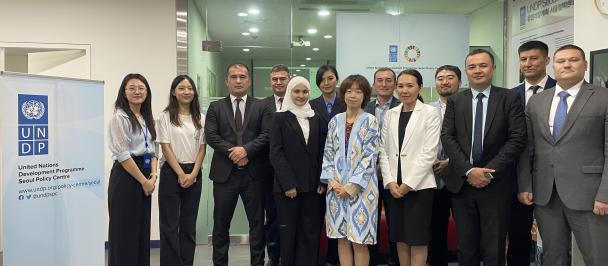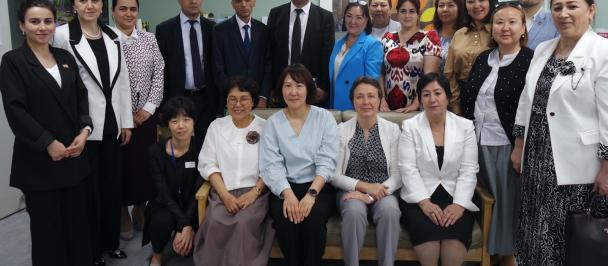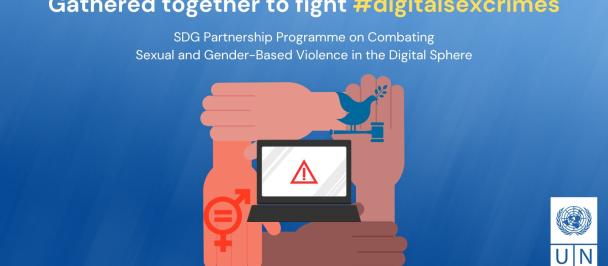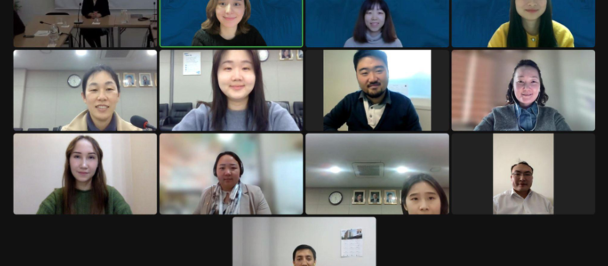UNDP’s ‘Training of Trainers’ webinar highlights Republic of Korea’s police capacity building and institutional reforms to address tech-facilitated gender-based violence
September 13, 2023

A three-day Training of Trainers (ToT) webinar, was jointly organized by UNDP Seoul Policy Centre (USPC), the Republic of Korea (ROK)’s Korean National Police Agency (KNPA) and UNDP Country Offices (COs) in Bangladesh, Bosnia and Herzegovina, and North Macedonia from 8 to 10 August 2023. The training aimed to share ROK’s experience in police capacity building and institutional reform to effectively address sexual and gender-based violence (SGBV) in the digital sphere, while representatives from UNDP COs and their national partners presented constructive action plans to enhance police capacity.

DAY 1: Knowledge sharing on ROK's police capacity building and education status with a substantial focus on secondary victimization and victim-centred approach
On Day 1, Mr. Mujin Lee, Programme Manager at USPC, opened the seminar with a warm welcome and wishes for an open space for lively discussion and a meaningful exchange to tackle technology-facilitated gender-based violence (TF GBV) more effectively.
The first main session featured a presentation on police capacity building by Ms. Yun-Cheng Chang, Senior Inspector and Team Lead in the Investigation and Legal Support Team of the Gyeonggi Northeastern Sunflower Center. An insightful analysis of the past and present training models of the Korean Investigation Police was presented, along with detailed implementation frameworks. Ms. Chang also introduced various education programmes, platforms, and campaigns to raise public awareness on SGBV in the digital space.
An active discussion on secondary victimization as well as victim-centered interview techniques took place in the subsequent Q&A session. Concerning the development of a training curriculum for KNPA, Ms. Chang stressed the importance of a gender-sensitive, victim-oriented approach that focuses on recovery and survivorship. Addressing multiple queries on secondary victimization, Ms. Chang highlighted the effectiveness of standardized police responses and manuals throughout the investigation process. She provided further insights on the NICHD Protocol**, a structured interview technique specifically used for interviewing women, children, and people with disabilities by the Korean Police.
DAY 2: Legal and systematic response of Korean police to tackle TF GBV and the need for stronger commitment for a society-wide perception change
Kickstarting the second day of training, Mr. Sungnam Jung, Investigator and Professor at the Korean Police Investigation Academy’s Women and Juvenile Affairs Division, started the webinar by presenting the legal and systematic reforms implemented in the ROK to combat SGBV in the digital sphere. Legislative and systemic reforms as well as the reconstruction of police organizations were discussed in detail. Furthermore, he shared the changes in trends regarding TF GBV in the ROK. The Nth Room Case*** brought about progressive changes in legislative and institutional systems, including the internal restructuring of KNPA including the establishment of a specialized response team. Mr. Jung also emphasized the importance of supporting victims, enhancing international cooperation, and increasing public awareness while providing practical guidelines for handling reports of TF GBV.

Ms. Kristina Plecic, Gender Specialist at UNDP North Macedonia, expressed her appreciation for KNPA’s efforts to construct a comprehensive system that encompasses multiple dimensions of GBV. She shared some recent cases of TF GBV that utilized Telegram in North Macedonia, and concurred on the need to raise awareness among both the public and law enforcement to accurately identify TF GBV as a criminal offense. She urged the active involvement of local and central government to bring about changes in the perception of SGBV.
In response to the questions raised on AI-based cybercrime and investigation methods by Ms. Naziza Rahman, Assistant Police Commissioner of the Bangladesh Police, Mr. Jung discussed issues of transparency along with the lack of legislative regulations on sexual exploitation in the virtual world. Mr. Jung also conveyed KNPA’s commitment to sustain their efforts to tackle the aforementioned areas and overcome such limits.
DAY 3: Constructive action plans of the three countries for the capacity enhancement of novice investigation police
The final day of the ToT webinar series began with group activities to develop detailed action plans for police capacity enhancement to address TF GBV more effectively. In this half-hour session, participants joined break-out rooms to devise a two-week training plan for 20 novice investigators that are part of the Women and Juvenile and Cyber Investigation Team.
As a result of the activities, North Macedonia proposed a two-week training session which consists of education on the concepts and legislations relevant to GBV crimes in the first week, and instructions on technical resources, such as open-source online tools, in the second week. Representatives of North Macedonia envisioned close cooperation with NGOs and CSOs for the collection of evidence and provision of psychosocial support to GBV survivors. Regarding secondary victimization, participants from North Macedonia expressed their commitment to properly approach survivors from diverse ethnic communities, taking their individual characteristics into account.
Bosnia and Herzegovina devised an action plan that incorporates a victim-oriented approach with a focus on crime prevention and awareness raising. The plan includes learning sessions on relevant legal and technical frameworks, investigative actions and methods to better support TF GBV survivors, and public workshops to raise awareness. Bosnia and Herzegovina also presented a group activity that utilizes prepared scenarios and mock trial exercises, allowing participants to apply their acquired knowledge in real situations. The importance of taking a proactive stance on TF GBV was emphasized throughout the curriculum.
Lastly, Bangladesh proposed a professional training programme to cope with fast-changing cybercrime trends in a timely manner and to properly communicate with GBV victims by adopting a trauma-informed approach. In addition to the Cyber Forensic Lab sponsored by the Anti-Terrorism Assistance Program of the United States and the need-based training offered by the Digital Literacy Center for cybercrime investigation officers, UNDP Bangladesh expressed its desire to collaborate with relevant NGOs/CSOs, youth organizations and media to raise public awareness on this issue.
Mr. Lee of USPC closed the webinar series by expressing gratitude to all the participants for their active participation and expressed his hope that the knowledge and ideas shared throughout the webinar could prove a catalytic input to move forward and improve each country’s effort to address TF GBV more effectively. He also reiterated the importance of strong engagement and support from national partners and expressed USPC, KNPA, and UNDP COs’ strong commitment to continue close collaboration to establish a society free from GBV.
* USPC shares Korea's tested-and-proven policy tools with other countries through SDG Partnerships. As part of this effort, USPC has been working with the Korean National Police Agency to share their knowledge and experience in responding to TF GBV with partner countries around the world since 2022.
** The National Institute of Child Health and Human Development (NICHD) Investigative Interview Protocol is a specific and structured interview technique developed by Dr. Michael Lamb at the US National Institute for Child Health and Human Development (NICHD). It is based on children’s cognitive and developmental characteristics and is utilized for forensic interviews with victims of child sexual abuse.
*** A massive digital sex crime case where victims, including underage girls, were blackmailed into uploading sexually exploitative content of themselves on the messaging application Telegram. Approximately 260,000 people paid with cryptocurrency to watch the content. “Nth Room” refers to a group of 8 Telegram chatrooms involved in the crime, labeled with ordinal numbers.

 Locations
Locations



